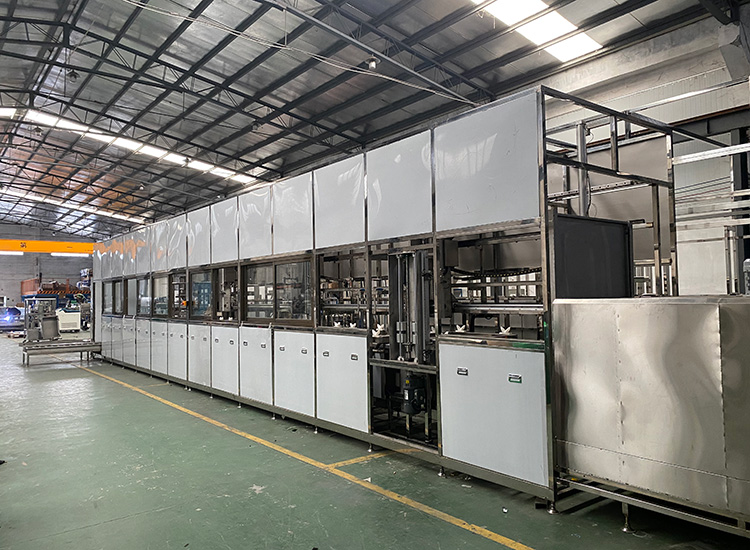EVs have been around a long time but are quickly gaining speed in the automotive industry. Learn how the long-coming and inevitable shift to electric impacts you.
Whether you want to build your own home theater or just learn more about TVs, displays, projectors, and more, we've got you covered. Ultrasonic Machines

Get tech's top stories in 30 seconds:
And that’s not even the expensive one
Yes, you probably do need to wash your records, and no, you probably don't need a $500+ machine to do it.
In the past, a golfer might have an old set of clubs knocking around in their trunk, ready to roll whenever they have time for a game between lunchtime martinis. And a music fan might give a vinyl record a swipe with a velvet pad to remove the dust occasionally. Now, though, our hobbies are swamped with accessories, and we spend hours discussing their value on Reddit instead of actually, you know, doing our hobbies. Are Pro-Ject Audio System's new vacuum-packing record-cleaning machines part of this problem, or are they essential?
"I've had experience with all manner of record cleaners, and my general rule is: if it costs more than the record player you're using to play your records, you probably don't need this vinyl accessory. I've used a few basic Spin-Clean type gadgets, and while none of them are perfect, those small spinning ones do the trick if you're even going to bother to clean your records," Jason Klamm, a record-label proprietor and creator of Celery Sound Records, told Lifewire via email.
Records are physical items, and they get dirty. Dust settles on them whenever they are out of their sleeves, and bad handling leaves fingerprints, skin oils, Cheeto dust, and taco grease on the vinyl’s surface. This can cause the record to crackle, pop, and skip, it can diminish sound quality and gunk up your record player’s stylus.
Pro-Ject Audio System's Vinyl Cleaner VC-S.
And then there’s dust-attracting static, which just makes everything more complicated.
The answer is to clean your records, preferably when you first get them. Second-hand records can be filthy, and even new records are handled by humans and the factory, and record-pressing plants aren’t exactly silicon-chip-making clean rooms. If you take care of them, then they probably won’t need another deep clean for many years.
Some folks just run a carbon-fiber brush through the grooves before playing. Others use a gadget like Audio-Technica’s Record Care Kit to wet-clean the disk as it spins on the turntable. Some, like me, spray a cleaning mixture based on distilled water and alcohol onto the record, gently wipe it, rinse with more distilled water, and leave it to dry.
But of course, there are more expensive and more effective gadgets to do the job for you.
Apparently, record-cleaning machines are excellent. The standard kind looks like a kind of super-boxy industrial record player. They spin the record while cleaning it with a cleaning solution and then suck out all the liquid and debris with a vacuum cleaner wand. This is how Pro-Ject's new units work, and $500 is a pretty standard price for this kind of thing.
If you have an extensive record collection, and a fancy stereo to play them on, that's not a bad investment. You can also go even further upmarket and spend thousands on ultrasonic cleaners that essentially shake the dirt loose from the record into a liquid bath, and although they are slow and noisy, in addition to being expensive, they are apparently excellent. As they should be, for $3,895.00.
You can also opt for a low-tech version of the vacuum-cleaning machine, like the SpinCare, or the Spin-Clean, mentioned by Klamm above, which is a liquid bath with velvet brushes where you do your own hand-powered spinning. These lack the vacuum to suck out the loosened filth, but you can always rinse the record with distilled water (just watch you don't douse the paper label).
So are the machines actually worth the extra cost? That_Random_Kiwi, a Reddit user, posted waveforms from recordings made from records before and after cleaning. The results are pretty conclusive. In the post-wash waveform, all the spikes caused by pops and clicks are gone.
"This is an original 50+-year-old Beatles album I honestly thought was toast from years of being abused on crap setups prior to me getting it… but nope, even just one application of cleaning fluid and spin around the vacuum it's removed like 80-90% of the noise and turned this from an unpleasant listening experience to something perfectly acceptable!" says That_Random_Kiwi.
So, a dedicated machine does a good job, but you can get good results with a microfiber cloth, a brush, some cleaning solution, and some distilled water. Or nothing if that has always worked for you, and you don't really care about this kind of stuff. After all, millions and millions of people enjoyed records for years and never even thought about cleaning them. Then again, those people's records are the filthy ones we're now buying used, so maybe it's time they got a spritz.
Get the Latest Tech News Delivered Every Day
Hit Refresh on Your Tech News

Ultrasonic Watch By clicking “Accept All Cookies”, you agree to the storing of cookies on your device to enhance site navigation, analyze site usage, and assist in our marketing efforts.